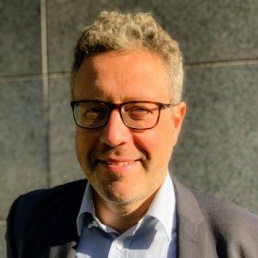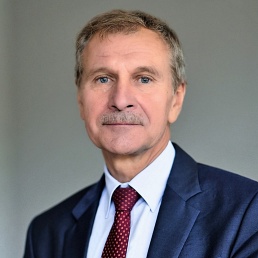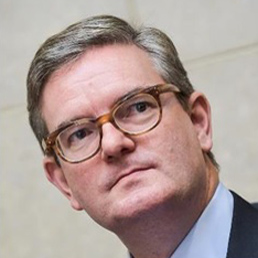HumanTech Meetings: Cyberbezpieczeństwo. Budowanie odporności na wirusy cyfrowe oraz inne zagrożenia w sieci

Z powodu pandemii nasze życie coraz bardziej zaczęło się przenosić do wirtualnego świata. Gwałtowny postęp technologiczny, mimo wielu zalet, niesie za sobą wiele nowych zagrożeń – czyhają one chociażby na użytkowników sieci. Czy zdołamy na czas wzmocnić środki bezpieczeństwa cyfrowego, które zapewnią nam skuteczną ochronę w dzisiejszej wspólnej cyberprzestrzeni?
Między innymi na to pytanie dotyczące cyberbezpieczeństwa odpowiedzą: sir Julian King – były Komisarz UE odpowiedzialny za sprawy cyberbezpieczeństwa, obecnie związany z Oxford University Institute, Jakub Boratyński – dyrektor z DG Connect Komisji Europejskiej, oraz eksperci, którzy wezmą udział w panelu dyskusyjnym.
Wydarzenie odbywa się w ramach konferencji innoSHARE University 2020. Spotkanie poprowadzi dr Michał Boni, były minister administracji i cyfryzacji, wykładowca na Uniwersytecie SWPS.
„HumanTech Meetings” – zadanie finansowane w ramach umowy 792/P-DUN/2019 ze środków Ministra Nauki i Szkolnictwa Wyższego przeznaczonych na działalność upowszechniającą naukę.
Prelekcje odbędą się w języku polskim oraz angielskim i będą tłumaczone.
Dołącz do nas! Oto link do spotkania »
Formuła spotkania
Żyjemy w czasach postępu technologicznego i dynamicznego rozwoju cyfryzacji. Współczesny pęd do tworzenia nowoczesnych rozwiązań może powodować trudne do przewidzenia skutki psychologiczne i społeczne. Dlatego tak ważne jest nawiązywanie współpracy między inżynierami, programistami, specjalistami IT oraz przedstawicielami nauk społecznych już na wstępnym etapie opracowywania nowej technologii lub usługi. To nie tylko daje szansę na uniknięcie błędów, lecz także umożliwia rozwinięcie innowacyjnego pomysłu.
Projekt HumanTech Meetings to seria spotkań skupiających naukowców i specjalistów z branży technologicznej z Polski i innych krajów. Każde spotkanie składa się z dwóch wykładów, jednego wygłoszonego przez eksperta z Polski i jednego wygłoszonego przez specjalistę z innego kraju. Po wykładach organizujemy dyskusje panelowe, podczas których zaproszeni goście przedstawiają różne podejścia do innowacji i technologii. Spotkania organizowane są przez Centrum Innowacji Społecznych i Technologicznych HumanTech Uniwersytetu SWPS.
Widoczne podczas pandemii cyfrowe przyspieszenie przyniosło nowe możliwości – dla biznesu, form pracy, konsumentów, zakupów, dla życia codziennego, edukacji czy unowocześnienia opieki zdrowotnej. Pojawiły się też jednak zagrożenia związane z bezpieczeństwem w sieci. Nasza konferencja pozwoli je zidentyfikować, poszukać odpowiedzi oraz nowych rozwiązań.
Z globalnego punktu widzenia kluczowe jest pytanie, czy odpowiednie standardy gwarantujące bezpieczeństwo w sieci będą przestrzegane przez wszystkie kraje. Z europejskiego punktu widzenia ważne jest, czy do nowych wyzwań dostosujemy efektywne prawo. Z krajowego punktu widzenia istotne jest zaś, czy będziemy umieli zarządzać ryzykiem i reagować na nie, ograniczając cyfrowe zagrożenia. Zapowiada się fascynujące spotkanie!
Więcej informacji »
dr Michał Boni, były minister administracji i cyfryzacji, Uniwersytet SWPS
Wystąpienia
Wykład 1: Cyberbezpieczeństwo – nowe wyzwania i nowe regulacje

Jakub Boratyński – is Acting Director of the Directorate H for Digital Society, Trust and Cybersecurity (Directorate-General Communication Networks, Content and Technology). He has been involved in negotiations of the Cybersecurity Act, the implementation of the Network and Information Security (NIS) Directive, preparation of the Commission’s Recommendations for a common EU approach to 5G network security, and development of actions for the EU cyber-security strategy on resilience and cooperation with the EU Agency for Network and Information Security (ENISA). He also contributed directly to the development of the EU Cybersecurity Strategy. He was former Head of the Organized Crime and Relations with EMCDDA unit at the European Commission (Directorate-General Home Affairs), responsible for the prevention of cybercrime, corruption, sexual abuse of children, and confiscation of criminal assets. He was also involved in negotiation and drafting of two directives (on cyber-attacks and sexual exploitation of children) and the establishment of the European Cybercrime Centre (EC3). Additionally, he has experience in the area of EU-Russia relations, which he has gained at the Directorate-General for External Relations. Prior to joining the European Commission, he was Director at the Stefan Batory Foundation in Warsaw and Policy Officer with the United Nations High Commissioner for Refugees. He is a graduate of the London School of Economics and the University of Warsaw (international relations, law).
Paneliści
CYBERBEZPIECZEŃSTWO – ZAGROŻENIA I BUDOWANIE ODPORNOŚCI W DOBIE CYFROWEJ SUWERENNOŚCI

Tomas Jakimavicius – is a Senior Director of Public Policy for the European region at the GSMA, the association representing over 750 mobile network operators and over 400 telecoms associated companies worldwide. Tomas has worked in the telecommunications industry for over 10 years and the wider technology sphere for over 15 years, and brings a plethora of experience in telecoms, cybersecurity, and wider ICT policy and regulation. Tomas is passionate about technology and its security thereof, and leads GSMA’s work on European cybersecurity policy. He contributes to these areas both within the GSMA and beyond, by speaking at events, participating in roundtables and relevant interest groups. Prior to joining the GSMA, Tomas has served as a diplomat with the Lithuanian Permanent Representation to the EU, where he represented Lithuania at the EU Council as the Telecoms and Digital Affairs Attaché (2010-2014). He was also Chairman of the EU Council’s ‘Telecommunications and Information Society’ Working Group during the Lithuanian Presidency of the Council of the EU, in the second half of 2013, where he conducted Member States’ negotiations on the Security of Network and Information Systems (NIS) Directive, among many other important EU legislation. Prior to this role, he served at the Ministry of Transport and Communications of the Republic of Lithuania, where he was Chief Policy Expert at the ICT Policy department (2009-2010). Earlier in his career, Tomas held advisory and consultancy positions in the private IT and trade business sector companies. Tomas received a Master’s of Leadership degree with an International Relations major from Boston University (Massachusetts, US), a Master’s of Enterprise Information Systems from the University of Westminster (London, UK) and a Bachelor’s degree in Informatics from the Kaunas University of Technology (Lithuania)..

Dariusz Kowalski – is a professor in the School of Computer and Cyber Sciences, Augusta University (Georgia, USA) and a visiting professor at SWPS University (Poland). He obtained his Ph.D. in computer science and M.Sc. in mathematics at the University of Warsaw (Poland). He worked at University of Quebec (Canada), University of Connecticut (USA), Max-Planck Institute for Informatics (Germany), IMDEA Networks (Spain) and University of Liverpool (UK). He designs, analyzes and applies algorithms in various fields, including distributed and parallel computing, network communication, fault-tolerance, security and privacy, search and clustering, game theory, discrete mathematics and biology. He supervised seven doctoral students, co-authored over 180 peer-reviewed publications (many in Core A or A* venues), book chapters and Encyclopedia of Algorithms entries. He received best paper award at the flagship EATCS conference ICALP 2018 for his work on anonymous dynamic networks (co-authored with Miguel Mosteiro).

Līga Raita Rozentāle – is the Microsoft Senior Director and Team Lead for EU Cybersecurity and Emerging threats. Līga currently also serves as a Special Advisor to the Latvian Mission to the UN and is a delegate for the UN Open Ended Working Group on Cyber Issues. Līga engages in the Women4Cyber Advisory committee and has been named by SC Magazine UK as one of the Top 50 European Women in Cybersecurity for 2019. Additionally, Līga brings to the role her experience as the first Latvian Cyber Diplomat at the EU and NATO where she chaired the EU working parties on both telecoms and cybersecurity and was a representative to the NATO Cyber Defence Committee. In addition to her career as a Latvian civil servant, Ms. Rozentāle has worked at the Global Cyber Alliance and James Martin Center for Nonproliferation Studies. Ms Rozentāle completed her studies at the Monterey Institute of International Studies, Wirtschaftsuniversitaet Wien and the University of Illinois. Ms. Rozentāle is a former UN Disarmament Fellow and holds CISM certification.

Krzysztof Silicki – graduated from the Warsaw University of Technology. Since 2004 he has been representing Poland on the Governing Council of the European Union Network and Information Security Agency (ENISA) and in the Executive Council (from 2013). He co-created ENISA's strategy and action plan on network and information security. In 2016 he was appointed Vice President of the ENISA Executive Board. In 1996 he organized the first team in Poland reacting to dangers on the Internet - CERT Polska. He is the originator of the annual SECURE conference - the first conference on ICT security in Poland. At the Ministry for Digital Affairs, he led the process of creating a law on the national cyber security system. He participates in many European and Polish projects and initiatives as an expert in the field of network and information security.
Wykład 2: JAK ODPOWIADAĆ NA ZAGROŻENIA W CYBERPRZESTRZENI?

Sir Julian King – was EU Commissioner for the Security Union from 2016-2019, with responsibility for counter terrorism, cyber security, tackling hybrid threats, disinformation, and securing critical digital infrastructure. He joined the Foreign & Commonwealth Office in 1985. He has held various positions, including: UK Ambassador to France (2016); Director General Economic & Consular (2014); DG of the Northern Ireland Office London and Belfast (2011); UK Ambassador to Ireland (2009); EU Commission Chef de Cabinet to Commissioner for Trade (2008); UK Representative on EU Political and Security Committee, (2004). Sir Julian is a graduate of Oxford University and the Ecole Nationale d’Administration, Paris.
Spotkanie poprowadzi

Michał Boni, Ph.D. – holds a doctoral degree in humanities. From 1977 to 1989, he was assistant professor at the University of Warsaw. He was an activist of the underground "S" organization and Head of the Mazovia region of "Solidarity" (1989-1990). He held several governmental and other prominent positions, including: Minister in the Labor and Social Policy (1991), Secretary of State in the Ministry of Labor and Social Policy (1992-1993), and Member of the Sejm (1991-1993). He was also the founder and head of the Institute of Public Affairs (1996-1997), advisor in the government of Jerzy Buzek, advisor to "Lewiatan", a Polish business organization, for EU projects (2002-2007), Head of Strategic Advisers to the Prime Minister Donald Tusk and the Permanent Committee of the Council of Ministers (minister: 2008-2011). He was the first minister of digitization in Central and Eastern Europe (2011-2013) and author of the DIGITAL POLAND program. He was a Member of the European Parliament (2014-2019), actively working in the Freedom and Justice Committee and the Industry and Science Committee (digital affairs). His area of expertise includes: legislation on data protection and privacy, access and information data as open data, the development of gigabit-society and 5G, the functioning of Artificial Intelligence, the establishment of the European Open Data Cloud for Science and Supercomputers in the EU. He is the initiator of the establishment program and fund: Rights and Values addressed to civic organizations. He is also the author and coordinator of work on the POLSKA 2030 report and YOUTH 2011 and YOUTH 2018 reports. He has also written many articles and larger publications, including "Artificial Intelligence and Management Beyond Ethics" (Martens Center). Currently, he is Assistant Professor at SWPS University and Senior Researcher Associate at Martens Center (a think tank in Brussels).
Organizator
Centrum Innowacji Społecznych i Technologicznych HumanTech >>
Partnerzy

Patroni medialni

Sponsor

Termin i miejsce
10 grudnia 2020 r. (czwartek)
online
Kontakt
e-mail: Ten adres pocztowy jest chroniony przed spamowaniem. Aby go zobaczyć, konieczne jest włączenie w przeglądarce obsługi JavaScript.Koordynator: Ewa Łuczak
e-mail: Ten adres pocztowy jest chroniony przed spamowaniem. Aby go zobaczyć, konieczne jest włączenie w przeglądarce obsługi JavaScript.
Projekt (no. 422493) dofinansowany przez Ministerstwo Nauki i Szkolnictwa Wyższego, w ramach "Funduszu Upowszechniania Nauki".



